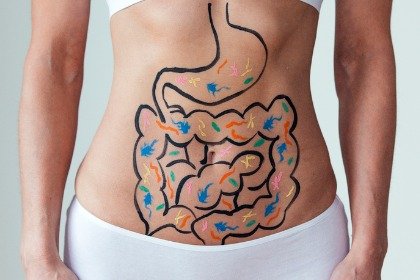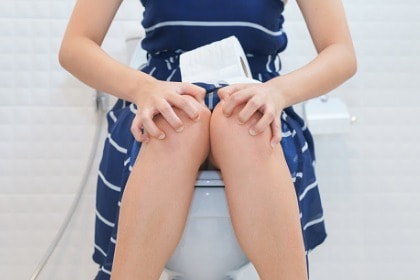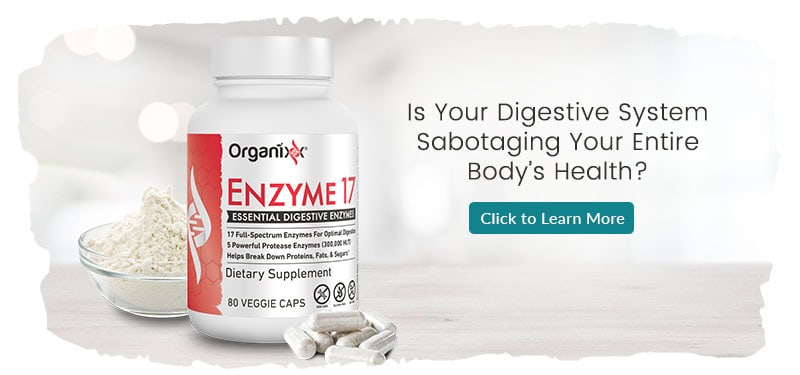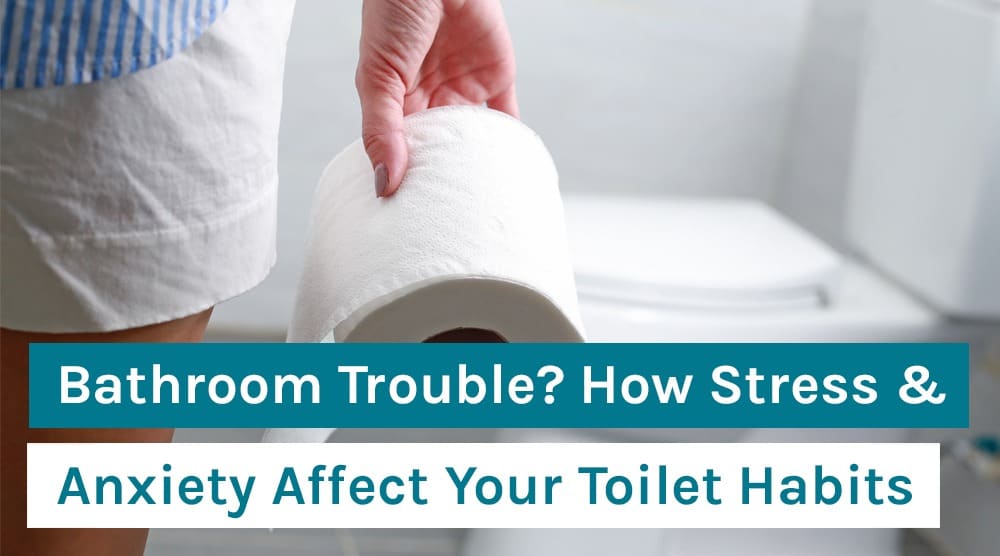Bathroom Trouble? How Stress & Anxiety Affect Your Toilet Habits
In a hurry? Click here to read the Article Summary...
If you’ve ever experienced a period of stress in your life that had you running back and forth to the toilet (or stopped you from going altogether), you know just how lousy it can make you feel. Going through the stress is bad enough, but the accompanying digestive discomfort makes a bad situation even worse. There are reasons why you either can’t go or can’t stop pooping when troubled by stress and anxiety… and plenty you can do about it. This article is devoted to helping you deal with the all-too-common problems of stress diarrhea and stress constipation.
Stress and Your Digestive Tract

There are physiological reasons why stress and anxiety can have a disturbing effect on gut health and lead to bowel-related issues. For one thing, your brain and digestive tract are inextricably linked.
Think about the saying “gut feeling.” Everyone knows what that means – a strong emotion felt right in the gut. Or how about when someone says something hurtful to you and you immediately have a “gut reaction.” Oftentimes this can feel like you’ve been physically punched in the stomach.
This is because your brain and digestive tract communicate with each other non-stop. The digestive tract has a complex of nerves (100 million neurons; more than in the spinal cord!) and acts as an organ of the nervous system as much as the brain does.
As a result, brain health is very much interlinked with gut health, meaning that something upsetting can not only cause mental distress but can also immediately be felt with your bathroom habits. In other words, you can’t stop pooping or feel like you have to poop, but can’t.
How a Candida Infection Can Affect the Brain
Imbalances in gut bacteria, such as a rampant candida infection, can also affect the brain. In fact, researchers have found that those with a history of candida infections were more likely to suffer from mental illness [1].
Stress Impacts Neurotransmitters

We also know that neurotransmitters, chemical messengers that move between nerve cells and influence their action, can get out of balance due to many different factors. Stress is a major reason for this imbalance.
Recent research has found that people with anxiety do not have enough specific neurotransmitters like serotonin for mood control OR proper bowel function [2].
Stress Diarrhea: What Happens When You Can’t Stop Pooping?
When you’re stressed or anxious, muscles in the gut can contract and spasm. These spasms, depending on where they happen in the gut, have a lot to do with what comes out of your body or what doesn’t come out.
If the spasms occur all along the digestive tract, the whole colon is contracting. This can be painful and cause stomach aches and even low back pain, but it also causes whatever is in the gut to move through very quickly, resulting in stress diarrhea.

Indirectly, stress diarrhea can decrease nutrient absorption because nutrients are passing through so quickly. Also, oxygenation to gut tissues decreases, blood flow through the digestive tract decreases, and necessary enzymes required to break down the nutrients are also decreased. All of this can, over time, play havoc with your health.
Can Stress Cause Constipation?
Can stress make you constipated as well as cause diarrhea? Unfortunately, the answer is yes! When stress is the issue, often what is occurring is that stress-related spasming in the gut is occurring in just one area. This effectively blocks up the colon, resulting in stress constipation.
The slow movement of nutrients through the gut with too little water getting absorbed creates dry stools. Dry stools are much harder (even painful at times) to excrete. A person can feel “blocked up,” have flatulence (gas), and feel fairly ill when they are having fewer than three bowel movements per week.
Stress Diarrhea vs Stress Constipation: Which Happens to You?
Whichever you experience when stressed – diarrhea or constipation – usually depends on your particular gut and its issues. According to Dr. Brian Kirsh, a gastroenterologist at the Cleveland Clinic, diarrhea is much more common than constipation when a person is under stress.
However, it depends upon your gut health and what you normally deal with. Stress pushes your gut towards its usual default operation, whether that be diarrhea or constipation.

Stress can also make underlying conditions such as Irritable Bowel Syndrome (IBS) or Crohn’s disease even worse, as sufferers from this condition will all too readily tell you. If the digestive tract is already prone to inflammation, stress just adds fuel to that fire.
Having constipation or diarrhea when you’re stressed does NOT mean you have a chronic condition like IBS or Crohn’s disease. That being said, long periods of unmanaged stress can certainly lead to these conditions.
People with chronic gut conditions generally have a variety of symptoms that can occur whether or not they’re stressed. If you’re experiencing these conditions frequently, please consult a trusted healthcare practitioner.
7 Tips for Minimizing Stress Diarrhea and Stress Constipation
1. Learn to De-stress. Because bowel function is a completely automatic process, it’s sometimes hard to see how dealing with stress will help you. But the biggest improvement in bowel issues will come from learning techniques on how to minimize stress and anxiety in the first place.
Addressing stress head-on through the regular practice of stress reduction techniques like cognitive behavioral therapy, meditation, mindfulness, physical activity, and/or counseling is vitally important and should be your first step.

2. Eat Healthfully. In order to ensure you’re not upsetting your bowels further, make your diet the healthiest foods possible. Avoid acidic foods such as soda, and especially sugar, alcohol, and excessive caffeine. Pay attention to what foods make your condition worse and avoid them when you’re feeling stressed.
Herbal teas and essential oils including chamomile, ginger, peppermint, and fennel are calming to the gut. Important: be careful when ingesting (swallowing) essential oils as only certain ones are safe and they must be high-quality oils intended for ingestion. Seek guidance from a qualified healthcare practitioner or aromatherapist.
Eat plenty of prebiotic foods like barley, oats, apples, bananas, dandelion greens, leeks, and asparagus. Prebiotics help to feed your beneficial gut flora. Omega-3 fatty acids in oily fishes (e.g., salmon, sardines, and mackerel) help brain health and assist with mood stabilization.
If stress constipation is the problem, increase your intake of fiber and lots of filtered water. High-fiber foods include whole grains, beans, lentils, vegetables, and fruit. Including these foods, plus the practice of regular stress reduction mentioned in tip #1, will help you regain regularity.
3. Relax with Essential Oils. Essential oils can be used in many ways to help reduce stress and anxiety levels. One of the most popular for this is lavender essential oil which promotes a sense of calm, helping you to relax.

Peppermint is also extremely healing for the gut. Recent research on peppermint oil and IBS found that enteric-coated capsules that don’t release peppermint oil until they reach the intestines are especially effective and won’t cause heartburn (which can happen if you put peppermint oil in capsules). Researchers found that the menthol in peppermint has antispasmodic action and stimulates a pain-relieving pathway referred to as TRPM8 [3]. The combined effect helps to ease the pain and discomfort of IBS.
Essential oils can be incorporated into many stress-reduction activities to multiply their benefits. Discover more here about essential oils for meditation and prayer, essential oils and massage, and essential oil baths.
4. Probiotics for Improved Gut Health. Gut imbalance is when a person has more bad bacteria (e.g., Candida albicans and E. coli) than good bacteria in their gut overall. Regularly supplementing with probiotics is one of the best ways to keep the balance in favor of the good bacteria in the digestive system.
Beyond all the general health benefits of having a healthy gut, one 2016 animal study found that supplementing with L. plantarum (the bacteria in Organixx ProBiotixx+ probiotics formula) “significantly reduced anxiety-related behavior” and “provided protection against stress-induced dysbiosis [4].”

5. Move Your Body. Exercise is important because it aids the digestive process and at the same time helps to decrease stress and anxiety. Make an effort to move your body for at least 30 minutes per day, five times per week. Yoga is wonderful, but just walking or gardening can make a big difference too. Check out some of the best exercises for women over 50 that don’t overstress the body.
6. Deep Breathing. This simple practice is incredibly beneficial when you’re feeling stressed or anxious. Take a break from whatever you’re doing and practice some deep, slow breaths. In through your nose for a count of five, and out through your mouth for a count of seven. Do this for a good five minutes and it will lower your heart rate and calm you down.
7. Get Maximum Nutrition by Using Digestive Enzymes. Enzymes are necessary for the digestion of food in your body. Raw plant foods provide the enzymes needed for good digestion, but most people eat a lot of cooked foods which have few to no enzymes. This places a burden on the pancreas to create more digestive enzymes which leaves it less time for other important bodily functions.
Taking a high-quality digestive enzyme supplement helps your body to digest food faster and more easily. This will also allow your body to pull more nutrients from the food you consume. Most people experience less intestinal gas and discomfort in general when their food is being fully digested.
These are seven actions you can take immediately to ease your burden of stress and anxiety and calm down digestive disorders like stress diarrhea and stress constipation. If you continue to have bowel problems once you have implemented the tips outlined above, be sure to consult with a trusted healthcare provider.
Organixx Enzyme 17 contains a whopping FIVE kinds of powerful protease enzymes in combination with one of the most advanced enzyme blends on the planet. It’s scientifically designed to help your body break down and process nutrients for better absorption, digestion, and overall health.

 Sources:
Sources:
Article Summary
Stress and anxiety can have a disturbing effect on gut health and lead to bowel-related issues including stress constipation and stress diarrhea.
When you’re stressed or anxious, muscles in the gut can contract and spasm. Depending on where they happen in the gut, these spasms have a lot to do with what comes out (or doesn’t come out) of your body.
Whichever you experience when stressed – diarrhea or constipation – usually depends on your particular gut and its issues, although diarrhea tends to be more common.
7 Tips for Minimizing Stress Diarrhea and Stress Constipation:
1. Learn to de-stress2. Eat healthfully
3. Relax with essential oils
4. Take probiotics for improved gut health
5. Move your body
6. Practice deep breathing
7. Get maximum nutrition from your food by taking digestive enzymes





This article uses 7 photos that include people. The final one includes 3 more people (blurred in the background), for a total of ten models shown in this short advertisement.
My question is -- Why were only pictures of female models chosen ? (10/10).
Is the author is suggesting that only women suffer from such gastrointestinal issues?
Is your supplement intended for women only?
I only pointed this out is to let someone know that the Ad creators bias is obvious. If it wasn't so blatant, I honestly wouldn't have noticed. As a physician, I pay close attention to details.
Perhaps I'm reading too much into this? Food for thought.
Hi Chuck, thank you for your feedback.
Please know, that we normally do try to portray a variety of ages, genders, and ethnicities in our article images. With that being said, we will be making some changes as soon as possible. Again, we appreciate you voicing your opinion on this matter and hope you have a great day!